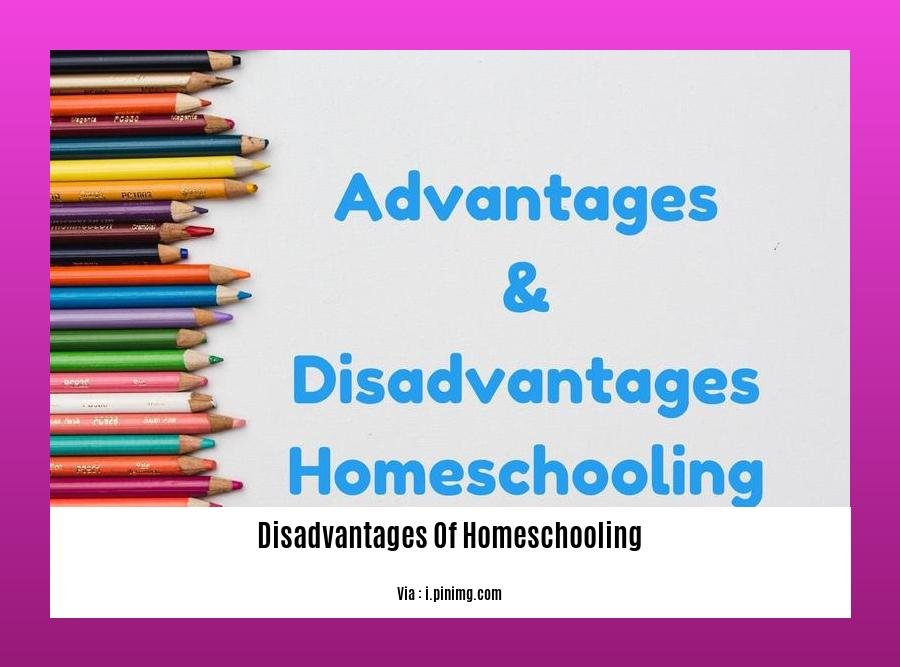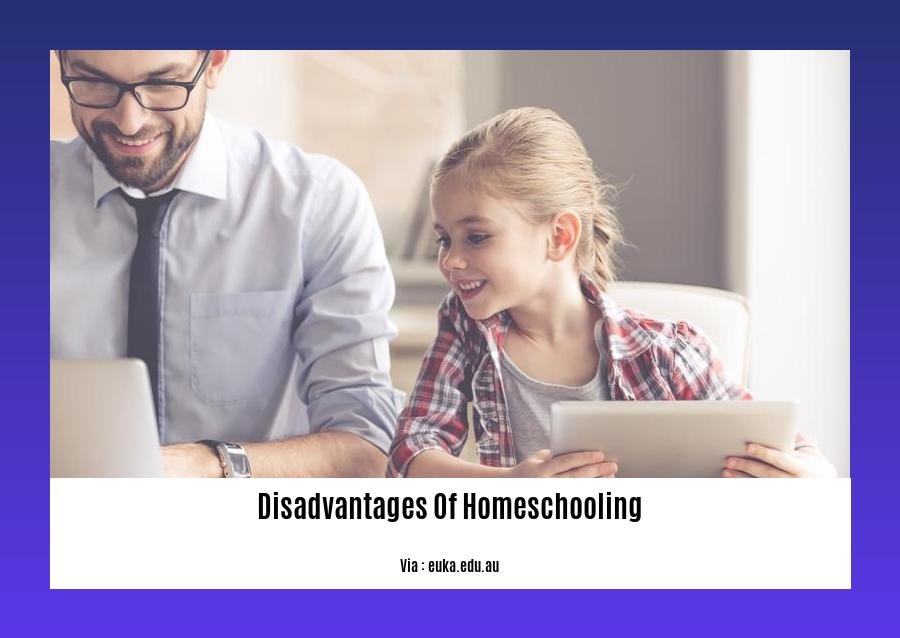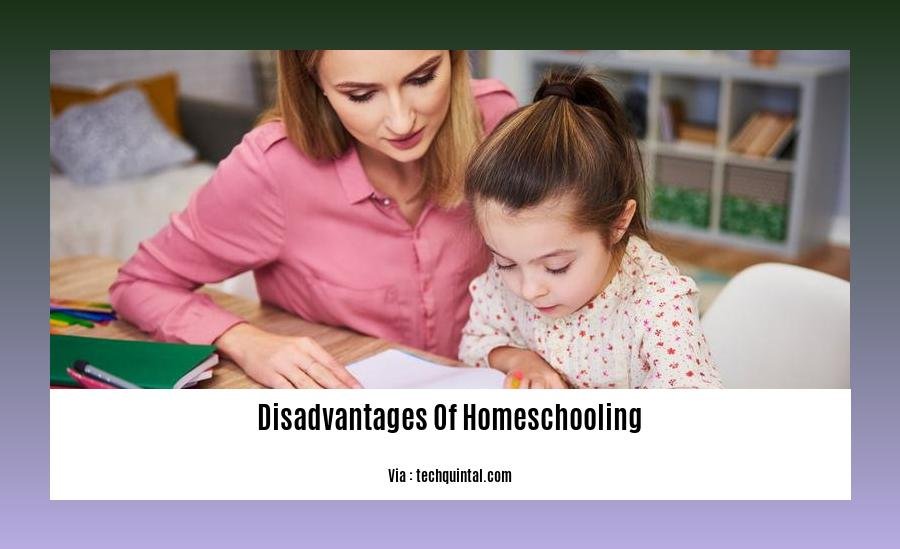In the realm of education, a critical examination of homeschooling methods unveils certain disadvantages that may compromise students’ academic growth, social development, and overall learning experiences. [The Disadvantages of Homeschooling: A Critical Examination of Educational Challenges and Drawbacks] delves into these drawbacks, highlighting the gaps and challenges associated with homeschooling.
Key Takeaways:
- Socialization Difficulties: Homeschooling may limit children’s opportunities to interact with peers, potentially hindering their social skills development.
- Organizational Demands: Homeschooling requires a high level of organization and planning, which can be overwhelming for parents and children.
- Financial Implications: Homeschooling can be more expensive than traditional schooling due to the cost of curriculum materials and the potential need for one parent to give up work.
- Lack of Accountability: Homeschooling lacks external oversight and standardized testing, making it challenging to assess a child’s progress and ensure they are meeting educational standards.
Disadvantages of Homeschooling: Unveiling the Challenges and Drawbacks


While homeschooling offers an alternative to traditional schooling, it comes with drawbacks that parents and educators should carefully consider.
Socialization Difficulties:
One of the disadvantages of homeschooling is the lack of socialization opportunities. Traditional schools provide a structured environment for children to interact with peers, fostering social skills, teamwork, and conflict resolution. Without these interactions, homeschooled children may struggle to develop the same level of social competence as their traditionally schooled counterparts.
Extra Costs Associated:
Homeschooling can be more expensive than traditional schooling. Parents may need to purchase curriculum materials, educational resources, and technology to facilitate learning. Additionally, one parent may need to forgo work to homeschool, potentially impacting the family’s financial stability.
Demanding on Organization:
Homeschooling requires a high level of organization and planning. Parents need to create a structured curriculum, allocate time for lessons, and maintain a disciplined routine. Without proper organization, homeschooling can become overwhelming, leading to stress and burnout for both parents and children.
Lack of Accountability and Oversight:
Traditional schools are subject to government regulations and standardized testing, ensuring a certain level of accountability. Homeschooled children, on the other hand, are not subject to the same level of oversight, making it challenging to assess their progress and ensure they are meeting educational standards.
Limited Access to Resources:
Homeschooling families may have limited access to resources and facilities available in traditional schools. This can include specialized teachers, laboratories, libraries, and extracurricular activities. This limited access can impact the quality of education and the child’s overall learning experience.
Legal and Regulatory Challenges:
Homeschooling regulations and laws vary from state to state. Parents considering homeschooling should carefully research the legal requirements in their area to ensure compliance. Failure to comply with these regulations can result in legal consequences.
Parental Involvement:
Homeschooling requires a high level of parental involvement. Parents must be prepared to take on the role of teacher, curriculum developer, and educational administrator. This demanding role can place a strain on family relationships and may not be suitable for families with busy schedules or limited educational resources.
If you’re debating whether homework is beneficial for your child, explore the disadvantages of homework to make an informed decision.
Considering a prefab home? Weigh the disadvantages of prefab homes before deciding if it’s the right choice for you.
If you’re a homeowner looking for ways to save on home improvement costs, consider checking out discount home improvement stores near me.
Stay informed about the functionality of home security cameras by discovering do home security cameras record all the time.
Disadvantages of Homeschooling Essay: A Critical Examination of Educational Challenges and Drawbacks
Despite the perceived advantages, homeschooling is not without its set of disadvantages. It’s crucial to weigh these drawbacks carefully before making a decision about a child’s educational journey.
Key Takeaways:
-
Lack of Socialization Opportunities: Homeschooled children may miss out on the critical social interactions and peer-to-peer collaborations that traditional schooling provides.
-
Educational Gaps: Homeschooling can make it challenging to ensure that children receive a well-rounded education and meet educational standards without professional guidance and oversight.
-
Assessment and Accountability: Homeschooling parents may not have the expertise to assess their children’s progress effectively, leading to gaps in learning and potential difficulties in transitioning to higher education or the workforce.
-
Parental Burnout: Homeschooling requires a significant time commitment from parents, who may experience burnout and stress due to the demands of teaching, curriculum planning, and managing household responsibilities.
-
Financial Implications: Homeschooling can incur additional costs for curriculum materials, educational resources, and technology, potentially straining family finances.
The Need for Comprehensive Oversight
Homeschooling requires a high level of parental involvement and organization. However, the lack of external oversight and accountability can make it difficult to ensure that children are receiving a quality education and meeting educational standards. This lack of oversight can also make it challenging to assess a child’s progress and identify areas where they may need additional support.
Additionally, homeschooling parents may lack the expertise and resources to provide their children with a well-rounded education. They may not have access to specialized teachers or facilities, which can limit a child’s exposure to diverse subjects and learning experiences.
Balancing Parental Roles
Homeschooling parents often struggle to balance their roles as educators and parents. They may feel overwhelmed by the responsibility of teaching their children while also managing household chores, work commitments, and other family obligations. This can lead to stress, burnout, and a decline in the quality of education provided.
Unforeseen Challenges
Homeschooling families may encounter various unforeseen challenges. For example, a parent may become ill or unable to continue homeschooling due to unforeseen circumstances. Similarly, a child may struggle with a particular subject or learning disability, requiring specialized support that homeschooling parents may not be equipped to provide.
Conclusion
Homeschooling can be a valid option for some families, but it’s essential to understand the potential disadvantages and challenges associated with this educational approach. Parents considering homeschooling should carefully weigh the pros and cons and ensure they have the resources, expertise, and support necessary to provide their children with a quality education.
FAQ
Q1: What are the primary challenges associated with homeschooling?
A1: Homeschooling can present challenges in areas such as socialization, organization, financial implications, and the lack of accountability.
Q2: How can the lack of socialization opportunities in homeschooling impact a child’s development?
A2: Limited social interactions during homeschooling can hinder a child’s social development, potentially affecting their ability to foster social skills, teamwork, and conflict resolution.
Q3: What are the organizational demands that parents face when homeschooling?
A3: Homeschooling requires parents to create structured curriculum, allocate time for lessons, and maintain a disciplined routine. Without proper organization, homeschooling can become overwhelming and lead to stress and burnout.
Q4: How can homeschooling impact a family’s financial stability?
A4: Homeschooling may involve additional expenses for curriculum materials, educational resources, and technology. Additionally, one parent may need to give up work to homeschool, potentially affecting the family’s financial situation.
Q5: Why is the lack of accountability a concern in homeschooling?
A5: Traditional schools are subject to government regulations and standardized testing, ensuring a certain level of accountability. Homeschooling, on the other hand, may lack external oversight, making it challenging to assess a child’s progress and ensure they are meeting educational standards.
- Upgrade Your Table Setting: Best Salad Forks 2025 - June 26, 2025
- Sage Green Throw Pillows: Transform Your Home Decor - June 26, 2025
- Find the Perfect Sage Green Rug: A Buyer’s Guide - June 26, 2025










